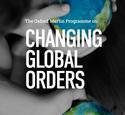The Predicament of International Organisations in a World Moving to Concentric Cooperation Circles
The regimes and organizations that, in many fields, frame and enforce the terms of coordination and cooperation among states operate under the umbrella of whatever constellation of forces maintains basic order in the world. If it is a hegemony, the superpower (with its closest allies) sets those terms. If it is a balance of power among rivals, the resulting constellation of regimes will likely be thinner.
The decades immediately after the end of World War II fit that story for security (most obviously in the veto powers of the UN Security Council’s permanent members), but not so well for commerce because Soviet leader Jozef Stalin walked his bloc out of the highways of the international economy. The West – initially alone, and later with East Asian friends – was left with that arena largely to itself, and so the General Agreement on Tariffs and Trade (GATT), the International Monetary Fund (IMF) and the World Bank were constructed through our own perspectives and values. That system of institutions deepened and broadened when, after the end of the Cold War, the US became an unrivalled superpower. But policy during the latter period fell into hubris, embracing an ‘international liberalism’ that was so foreign to any kind of realist liberalism (sensitive to incentives, power, and order) that, as things turned out, it helped put our liberal world in jeopardy. A key case study for that is the WTO, launched as a universalist organisation in 1995.
The People’s Republic of China (PRC) uses state-owned enterprises to subsidise exports. A little over a decade ago, Washington formally complained that such subsidies were illegal under the WTO rules, and so either Beijing should stop it or the US (and others) would be entitled to impose tariffs as countervailing measures. While effectively accepting they were subsidies, Beijing responded that they were not illegal subsidies under international law. When the dispute reached the apex of the WTO’s system, the Appellate Body held in favour of Beijing on the basis that Chinese state-owned enterprises (SOEs) were not public entities within the meaning of the WTO treaty. It was a curious finding for a Party-led state in which the SOEs could hardly be described as autonomous, but that the judges were out of their depth was only symptomatic of deeper architectural problems. The US, beginning with the Obama administration, lost faith in the WTO dispute system, declining to approve new judges, leading to progressive atrophy.
In that kind of situation, one might expect the superpowers to bargain over a reform that, looking forward, would reduce in this case China’s gains and American losses from sticking with the Appellate Body’s doctrine. But every single member of the WTO has a veto on changing rules, so there was and is next to zero prospect of formal reform. That signals the architects of the WTO effectively believed either that they were writing a perfect treaty that would last for all time – which would be incompetent, or, alternatively, that no questions would ever arise that could not be handled by the judges in ways that left the system intact. Behind either belief would lie a blithe assumption that no future Great Power would ever depart from the liberal values inscribed into the GATT. In other words, the design of liberal institutions took it for granted that liberalism had prevailed, forever. It turns out, in other words, that there really was a so-called end-of-history-moment – in policy, not only in newspaper commentary. Because, of course, the PRC has risen to become a Great Power, and it manifestly does not subscribe to the basic tenets of a liberal system of trade but, rather, to a form of state-sponsored mercantilism focused on generating cumulative surpluses that can be invested so as to promote geopolitical and geo-economic shifts in its own favour.
That contest between China and the liberal parts of the world – Western and East Asian – will last many decades, quite possibly a century or more. It will be everywhere, in everything, neither side can knock out the other, and it is deeply ideological. In that, the contest more closely resembles that between Britain and France throughout the long eighteenth century than the historical episodes commonly favoured by commentators. Despite something like a proxy war in Ukraine, it is not (yet) entirely like the old Cold War since so far it is also definitely commercial. But nor is like the struggle between Britain and the Second German Reich at the turn of the twentieth century, as that was about power without being deeply ideological.
That the current contest is ideological is clear from – oddly, in the West, barely known – Document 9, which was released or leaked from Beijing’s Communist Party Central Committee in 2013. Vitally important for understanding China, it articulates ‘Seven No’s’ that, in no uncertain words, instruct Chinese people not to promote or even discuss the values and institutions associated with liberal democracy, never mind contemplating alternatives to the Party’s rule and ways.
How should we think about our predicament? Policymakers will not be helped by idealism, a version of which brought us here. But nor could they sensibly rely on a cynical realpolitik that struggles to explain, without deception, why sacrifice might become necessary. I have argued in my book Global Discord that for an approach that is both realistic and principled, we should turn away from Hobbes, Kant and their respective followers. Rather, we could usefully turn to the philosophers David Hume and Bernard Williams, both of whom are lamentably neglected by scholars working on international relations, political theory and organisations.
Taken together, their work emphasizes the importance of the social norms and values that hold together a political society, rendering legitimate the system of authority that maintains order, protection, degrees of trust and, hence, conditions for cooperation. While those norms often have their origins in the contingencies of history, they need to survive the community’s critical reflection if they are to withstand the pressure of adversity and disappointments. A legitimacy worth the name is both prescriptive and reflexive.
All that being so, for the United States and its closest allies, the core objective, however appealing and important, cannot simply be to remain top dog(s) whatever the cost. Rather our bedrock objective should instead be to hold on to the distinctive way of (political) life that characterises the constitutional democracies in which some of us consider ourselves lucky to live.
At a strategic level, that means adopting what social scientists term a robust approach: seeking to minimize the costs of plausible worst-case scenarios. More prosaically, it entails three things: ensuring the resilience of the core systems upon which we rely; nurturing and maintaining friendships around the whole world; and avoiding costly unforced policy errors.
While such prescriptions sound obvious to the point of triviality, they are anything but that. Taking only the last of the three, unforced policy errors continue as though we were back in the mid-1990s, safe to experiment with regimes and organisations because, with Washington the only true Power, the stakes were low. For example, today the West very obviously cannot afford another financial crisis, which benefited no one more than Beijing after 2008, and yet egregious policy blunders led to messy and dangerous big banking failures on both sides of the Atlantic in early 2023. To perform better, Western governments need to overcome the many policy silos that developed while their global leadership seemed to be written in the end of history’s Hegelian stars. Trade policy, financial policy, health policy, and many other areas are directly relevant to security, yet this is only slowly being grasped.
The bottom line is that each state can prudently cooperate more ambitiously with states with which they have more in common, and fear least. This maxim points – positively and normatively – to a world of concentric cooperation circles. The outermost circle is where the thinnest international norms seek to preserve peaceful coexistence, accommodating harmless trade that leaves neither side dangerously exposed to the other. It is a circle where some states do not even honour the most basic peremptory norms of international law, which is the preserve of, from our perspective, the second circle. For each state, as they move inwards to circles shared with progressively like-minded states and peoples, having more norms and even ways of life in common, cooperation becomes thicker and deeper.
For many international organizations, the move to such an international order – one in which cooperation will vary from threadbare to deep depending on who participates – will not be comfortable. It is a world in which, most likely, the WTO remains largely marginalised, with trade-policy action being mainly in ‘regional’ pacts. A world in which the IMF and World Bank do not adjust, constitutionally, to a new world order for the simple reason that its basic shape and terms remain unclear. But it can also be a world where there is nothing to stop groups of like-minded states launching cooperative initiatives in particular fields, just as the old group of ten banking nations did when, fifty years ago this year, they established the Basel Committee, which grew in depth and breadth organically to include emerging-market economies.
Plainly, there will be risks of overshooting. What begins as sensible de-risking – a process that makes sense, symmetrically, for both the West and Beijing – could spiral into a protectionist Cold War unless top policymakers exercise hard-headed restraint. A good place to start would be to seek an acquis through which the trade and investment regimes make more room for security concerns without giving individual nations carte blanche. Some leading trade scholars are starting to discuss that.
More elementary still, to avoid horrendous accidents sparking armed conflict, some kind of de-escalation protocol is needed between the superpowers. For years, Beijing declined to take up Washington’s overtures, but at least their Defence ministries are now talking to each other again, and there are reports of back channels being established. Consistent with London and Paris’s up and down relations during the eighteenth century, this will be the first of many lulls, but also I predict many storms, in the decades ahead. It is not an easy time to lead international organizations, let alone to establish new ones.
The views and opinions expressed in the CGO blog posts are those of the authors and do not necessarily reflect those of the programme and its partners.

|
Paul Tucker is a Research Fellow at the Mossavar-Rahmani Center for Business and Government, Harvard Kennedy School. He is the author of the book Global Discord: Values and Power in a Fractured World Order (Princeton University Press 2022). The paperback edition (April 2024) includes a new preface on which this blog draws. Reprinted here by permission of the publisher and all rights reserved.




